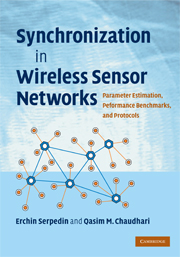 Synchronization in Wireless Sensor Networks
Synchronization in Wireless Sensor Networks Book contents
- Frontmatter
- Contents
- Preface
- 1 INTRODUCTION
- 2 SIGNAL MODELS FOR TIME SYNCHRONIZATION
- 3 TIME SYNCHRONIZATION PROTOCOLS
- 4 FUNDAMENTAL APPROACHES TO TIME SYNCHRONIZATION
- 5 MINIMUM VARIANCE UNBIASED ESTIMATION (MVUE) OF CLOCK OFFSET
- 6 CLOCK OFFSET AND SKEW ESTIMATION
- 7 COMPUTATIONALLY SIMPLIFIED SCHEMES FOR ESTIMATION OF CLOCK OFFSET AND SKEW
- 8 PAIRWISE BROADCAST SYNCHRONIZATION (PBS)
- 9 ENERGY-EFFICIENT ESTIMATION OF CLOCK OFFSET FOR INACTIVE NODES
- 10 SOME IMPROVED AND GENERALIZED ESTIMATION SCHEMES FOR CLOCK SYNCHRONIZATION OF INACTIVE NODES
- 11 ADAPTIVE MULTI-HOP TIME SYNCHRONIZATION (AMTS)
- 12 CLOCK DRIFT ESTIMATION FOR ACHIEVING LONG-TERM SYNCHRONIZATION
- 13 JOINT SYNCHRONIZATION OF CLOCK OFFSET AND SKEW IN A RECEIVER–RECEIVER PROTOCOL
- 14 ROBUST ESTIMATION OF CLOCK OFFSET
- 15 CONCLUSIONS AND FUTURE DIRECTIONS
- Acronyms
- References
- Index
5 - MINIMUM VARIANCE UNBIASED ESTIMATION (MVUE) OF CLOCK OFFSET
Published online by Cambridge University Press: 05 August 2012
- Frontmatter
- Contents
- Preface
- 1 INTRODUCTION
- 2 SIGNAL MODELS FOR TIME SYNCHRONIZATION
- 3 TIME SYNCHRONIZATION PROTOCOLS
- 4 FUNDAMENTAL APPROACHES TO TIME SYNCHRONIZATION
- 5 MINIMUM VARIANCE UNBIASED ESTIMATION (MVUE) OF CLOCK OFFSET
- 6 CLOCK OFFSET AND SKEW ESTIMATION
- 7 COMPUTATIONALLY SIMPLIFIED SCHEMES FOR ESTIMATION OF CLOCK OFFSET AND SKEW
- 8 PAIRWISE BROADCAST SYNCHRONIZATION (PBS)
- 9 ENERGY-EFFICIENT ESTIMATION OF CLOCK OFFSET FOR INACTIVE NODES
- 10 SOME IMPROVED AND GENERALIZED ESTIMATION SCHEMES FOR CLOCK SYNCHRONIZATION OF INACTIVE NODES
- 11 ADAPTIVE MULTI-HOP TIME SYNCHRONIZATION (AMTS)
- 12 CLOCK DRIFT ESTIMATION FOR ACHIEVING LONG-TERM SYNCHRONIZATION
- 13 JOINT SYNCHRONIZATION OF CLOCK OFFSET AND SKEW IN A RECEIVER–RECEIVER PROTOCOL
- 14 ROBUST ESTIMATION OF CLOCK OFFSET
- 15 CONCLUSIONS AND FUTURE DIRECTIONS
- Acronyms
- References
- Index
Summary
Assuming both symmetric and asymmetric exponentially distributed network link delays, this chapter is focused on finding the BLUE-OS and the MVUE for the clock offset between two nodes and evaluates their performance in terms of the MSE, which is chosen as the performance criterion throughout this book. The timing exchange mechanism between the two nodes is the same classical two-way message exchange mechanism adopted in protocols such as TPSN, NTP, etc.
The main topics in this chapter are as follows. First, BLUE-OS, an estimation scheme that has gone largely unnoticed in engineering literature, is investigated in the context of clock offset and the relevant clock offset estimators are derived. Second, the Rao–Blackwell–Lehmann–Scheffé theorem is used to derive the MVUE and it is shown that the MVUE coincides with the BLUE-OS. Therefore, in the class of unbiased estimators, BLUE-OS is the optimal solution and no other estimator can be found with less MSE (or variance, which is the same as MSE in the unbiased case) than MVUE. For the sake of completeness, the clock offset estimators are also derived for two scenarios, namely when the mean of the exponential link delays is known for each direction and when it is unknown for each direction. Third, a short commentary on whether the MVUE is the best possible solution as compared to the other estimators, such as the MLE, is presented.
- Type
- Chapter
- Information
- Synchronization in Wireless Sensor NetworksParameter Estimation, Performance Benchmarks, and Protocols, pp. 42 - 61Publisher: Cambridge University PressPrint publication year: 2009


